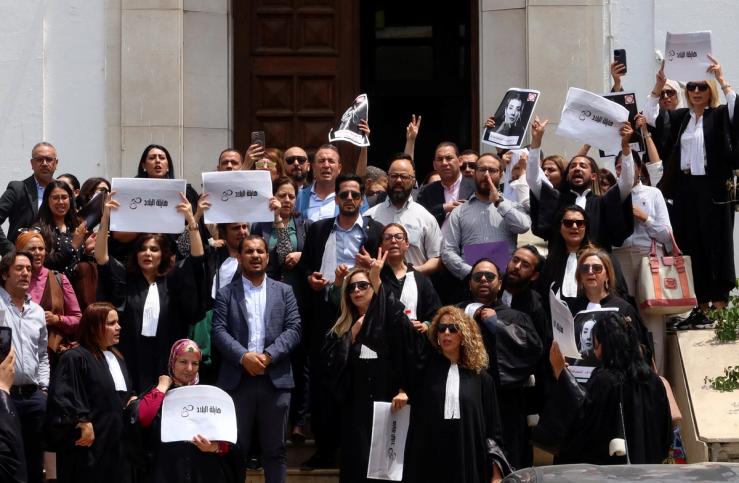The News
Tunisian lawyers held a national strike on Tuesday to protest a police raid on the country’s bar association headquarters and the arrest of a high-profile lawyer known to be critical of the government.
Sonia Dahmani was arrested after taking refuge inside the bar’s association headquarters and detained on Saturday after she made sarcastic comments about Tunisia’s economic woes on television last week. Police also arrested two radio journalists for their comments on air as well as social media posts, according to their lawyers.
They are the latest among the dozens of lawyers and journalists who have been detained under Decree 54, a law introduced by Tunisia’s President Kaies Saied in 2022. The law was designed to combat cybercrime and misinformation, but it is increasingly being used to silence the president’s critics.
Saied was elected in 2019 in the country’s second presidential election after the pro-democracy Arab Spring uprisings. But he shut down parliament and assumed authority over the judiciary in 2021, a move the opposition calls a coup.
The arrests also come as more Tunisians are taking to the street to demand Saied set a date for this year’s presidential elections, a delay that opposition party members have also criticized him for.
SIGNALS
Decree 54 arrests are a ‘witch hunt’ and a threat to free speech: Watchdogs
In an analysis of the Presidential Decree-Law 2022-54, known as Decree 54, Tunisian non-profit media collective Inkyfada described the law’s use as a “witch hunt.” The outlet reported more than twenty cases from 2023 in which journalists, lawyers, politicians, academics, and activists were detained for comments they posted online or made to the media. “No one is safe,” the president of the National Union of Tunisian Journalists said, “this type of surveillance is life threatening.” The International Commission of Jurists, an advocacy group based in Geneva, noted the law’s criminalization of “fake news” and “rumors” are overbroad and vague, constituting a “serious threat to the exercise of the right to freedom of expression.”
Opposition parties say Tunisia lacks the conditions to hold a free vote
Tunisia’s main opposition coalition in parliament, the National Salvation Front, announced a boycott of this year’s presidential elections, which have not yet been scheduled. “The Front rejects participation in any electoral charade due to the absence of conditions for fair and democratic elections,” coalition leaders said, and called for the release of political opponents and reinstatement of Tunisia’s judiciary. At least seven candidates — many jailed in Tunisia or exiled abroad — have said they will run, declarations that local outlet Tunigate said are designed to “embarrass President Kais Saied to remove the ambiguity of the election date.” Foreign Policy’s Allison Meakem said it’s difficult to gauge how many Tunisians support the president, as opposition boycotts of parliamentary elections made “the results almost comically lopsided.”
Tunisia is a problematic partner in Europe’s migration crisis
Located just 130 kilometers offshore of Italian islands like Lampedusa, the Tunisian city of Sfax is a hub for both Tunisians and Sub-Saharan migrants attempting to cross into Europe. President Saied has pushed for the deportation of migrants, authorized camp sweeps and activist arrests, while tensions have risen domestically as Tunisians increasingly compete with refugees and migrants for resources and jobs. The EU has a stake: The bloc signed a €105 million border management deal with Tunisia in 2023, a move that Amnesty International’s European director called “deeply immoral.” Meanwhile, one analyst from the European Council on Foreign Relations noted the deal is “designed to keep migrants and refugees out of the EU, not Tunisia itself.”



